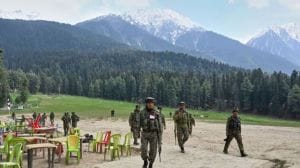Take a look at the essential events, concepts, terms, quotes, or phenomena every day and brush up your knowledge. Here’s your knowledge nugget for today.
Knowledge Nugget: Enemy Property
Subject: Polity and History
(Relevance: Topics related to property rights are crucial for the UPSC CSE, as they encompass constitutional amendments and Fundamental and Constitutional Rights. Understanding the concept of ‘enemy property’ can enhance our understanding of property rights within a broader context by linking it to history, legal frameworks, national security issues.)

Why in the news?
Properties worth an estimated Rs 15,000 crore, owned by the Pataudi family and partially linked to actor Saif Ali Khan, could be taken over by the government under the Enemy Property Act, 1968. Madhya Pradesh High Court has asked actor Saif Ali Khan to approach the appellate authority against an order of the central government that declared historical properties of the Pataudi family in Bhopal, estimated to be worth Rs 15,000 crore, as “enemy property”.
Key Takeaways :
1. Enemy property are the assets (movable and immovable) that were left behind in India by individuals who migrated to countries designated as “enemy nations” during times of conflict.
2. In the wake of the India-Pakistan wars of 1965 and 1971, there was migration of people from India to Pakistan. Under the Defence of India Rules established by the Defence of India Act of 1962, the Government of India seized the properties and companies of individuals who acquired Pakistani nationality.
3. These properties, referred to as “enemy properties,” were entrusted to the Custodian of Enemy Property for India by the central government. A similar process was followed for the properties left behind by individuals who moved to China after the Sino-Indian War in 1962.
4. Notably, under the Enemy Property Act of 1968, properties designated as enemy properties remain permanently vested with the Custodian of Enemy Property, meaning they cannot be inherited or transferred. This law establishes the legal framework that allows the central government to manage and maintain control over enemy properties in various states.
Story continues below this ad
Enemy Property (Amendment and Validation) Act, 2017
1. The Enemy Property (Amendment and Validation) Act of 2017 reinforced the Enemy Property Act of 1968 and broadened its scope.
2. The amended Act expanded the definition of the term “enemy subject”, and “enemy firm” to include the legal heir and successor of an enemy, whether a citizen of India or a citizen of a country which is not an enemy; and the succeeding firm of an enemy firm, irrespective of the nationality of its members or partners.
3. The amended law provided that enemy property shall continue to vest in the Custodian even if the enemy or enemy subject or enemy firm ceases to be an enemy due to death, extinction, winding up of business or change of nationality, or that the legal heir or successor is a citizen of India or a citizen of a country which is not an enemy.
4. The thrust of the amendments was to guard against claims of succession or transfer of properties left by people who migrated to Pakistan and China after the wars. The amendments effectively eliminated inheritance claims, ensuring that such properties remained indefinitely under government control.
Story continues below this ad
BEYOND THE NUGGET: Right to Property
1. Originally, Article 19 (1) (f) and article 31 of Constitution of India contained the right to property, i.e. to acquire, hold and dispose of property subject to the right of State to compulsory acquisition for public purposes by authority of law.
2. The 44th Constitution Amendment in 1978 removed the right to property from the list of Fundamental Rights by omitting sub-clause (f) of Article 19(1) and Article 31 from the Constitution. However, the right to property was established as a constitutional right by the insertion of a new article, Article 300A, which is titled “Right to Property.”
3. Recently, a bench of Justices B R Gavai and K V Viswanathan said in its judgement, “Right to Property ceased to be a Fundamental Right by the Constitution (Forty-Fourth Amendment) Act, 1978, however, it continues to be a human right in a welfare State, and a constitutional right under Article 300-A of the Constitution. Article 300-A of the Constitution provides that no person shall be deprived of his property save by authority of law. The State cannot dispossess a citizen of his property except in accordance with the procedure established by law,”.
4. The decision came on an appeal against the November 22, 2022 judgement of a Division Bench of the Karnataka High Court dismissing the challenge to the judgement of a single judge of the HC on the question of acquisition of land for the Bengaluru-Mysuru Infrastructure Corridor Project in 2003.
Story continues below this ad
(Sources: Saif Ali Khan’s ‘enemy property’ case: what are these properties, and what is the law?,What is enemy property in India, SC’s ruling on Article 19, No one can be deprived of property without adequate compensation: SC)

🚨New Year Special: Click Here to read the January 2025 issue of the UPSC Essentials monthly magazine. Share your views and suggestions in the comment box or at manas.srivastava@indianexpress.com🚨
Subscribe to our UPSC newsletter and stay updated with the news cues from the past week.
Stay updated with the latest UPSC articles by joining our Telegram channel – Indian Express UPSC Hub, and follow us on Instagram and X.
Story continues below this ad



































